-
 +50 +2
+50 +2Life on Earth may have begun 300m years earlier than previously thought
Living organisms may have existed on Earth as long as 4.1bn years ago – 300m years earlier than was previously thought, new research has shown. If confirmed, the discovery means life emerged a remarkably short time after the Earth was formed from a primordial disc of dust and gas surrounding the sun 4.6bn years ago. Researchers discovered the evidence in specks of graphite trapped within immensely old zircon crystals from Jack Hills, Western Australia.
-
 +46 +2
+46 +2How humans are driving the sixth mass extinction
Scientists have been warning for decades that human actions are pushing life on our shared planet toward mass extinction. Such extinction events have occurred five times in the past, but a bold new paper finds that this time would be fundamentally different. Fortunately, there’s still time to stop it.
-
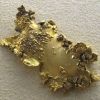 +48 +1
+48 +1Trisulfur anion helps explain gold deposits on Earth
People have been excavating gold for thousands of years as a precious rare metal. Gold is in relatively low abundance in the Earth's crust likely coming from the metallic core and from meteorites. For reasons that are not entirely known, even though the average amount of gold throughout the Earth's crust is small, there are deposits containing gold in significantly greater concentrations than the crust's average abundance.
-
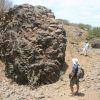 +50 +2
+50 +2The Most Destructive Wave in Earth’s (Known) History
Rising from the Atlantic ocean, hundreds of miles off the coast of West Africa, there’s a volcano with a 73,000-year-old scar swiped across its face. This is the mark of an ancient catastrophe, etched into the rock when a huge chunk of the volcano’s eastern flank rushed all at once into the sea. That particular flank collapse displaced enough water to generate a powerful tsunami—one that, new evidence shows, might have been much, much bigger than geologists previously believed.
-
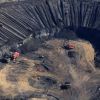 +27 +1
+27 +1Lockdown: the End of Growth in the Tar Sands
Just a few days ago, Hurricane Patricia became the strongest hurricane ever measured as it made landfall on the western coast of Mexico. It hit as we approach the end of another year that is expected to break last year’s record as the hottest year of recorded temperatures.
-
 +51 +1
+51 +1Should we rebuild lost ecosystems through trophic rewilding?
We humans have altered our planet's surface, atmosphere, and its flora and fauna so dramatically that our impact is the defining feature of our geographical age, the Anthropocene. One school of thought regarding how to best fix, or at least halt, some of the damage we've caused to various ecosystems is to “rewild” them—to meddle even more by (re)introducing species to a landscape in order to help it revert to a healthier, pre-human-impact state.
-
 +47 +1
+47 +1What Every Climate-Concerned Billionaire Should Do
The idea is simple. People burn fossil fuels. The fuels emit carbon dioxide into the atmosphere. If that carbon lingers in the air, it causes greenhousing and contributes to global warming; if it gets absorbed by the ocean, it acidifies the water and wrecks the marine food chain. So the key is to put less carbon into the atmosphere. Most policies, accordingly, focus on preventing people from burning fuels. But what if the fossil fuels were never...
-
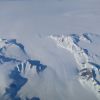 +30 +1
+30 +1NASA Study: Mass Gains of Antarctic Ice Sheet Greater than Losses
A new NASA study says that an increase in Antarctic snow accumulation that began 10,000 years ago is currently adding enough ice to the continent to outweigh the increased losses from its thinning glaciers. The research challenges the conclusions of other studies, including the Intergovernmental Panel on Climate Change’s (IPCC) 2013 report, which says that Antarctica is overall losing land ice.
-
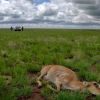 +51 +2
+51 +2Half of world's rare antelope population died within weeks
More than half of the world’s population of an endangered antelope died within two weeks earlier this year, in a phenomenon that scientists are unable to explain. At least 150,000 adult saiga antelopes were buried during a fortnight in May, but scientists say the actual figure will be significantly higher as many more carcasses were found but not counted as part of the burials. Calves were not counted, but it is thought that hundreds of thousands died too.
-
 +41 +2
+41 +2From Deep Freeze to Drought: 10 Extreme Weather Events
Some of the extreme weather experienced around the world last year is our fault, according to a report by the U.S. National Oceanic and Atmospheric Administration.
-
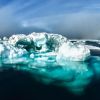 +49 +2
+49 +2Scientists say Greenland just opened up a major new ‘floodgate’ of ice into the ocean
As the world prepares for the most important global climate summit yet in Paris later this month, news from Greenland could add urgency to the negotiations. For another major glacier appears to have begun a rapid retreat into a deep underwater basin, a troubling sign previously noticed at Greenland’s Jakobshavn Glacier and also in the Amundsen Sea region of West Antarctica. And in all of these cases, warm ocean waters reaching the deep bases of marine...
-
 +27 +2
+27 +2Growing corals bathe themselves in acid without suffering damage
Acidic water may be a sign of healthy corals, says a new study, muddying the waters still further on our understanding of how coral reefs might react to climate change. Andreas Andersson of the Scripps Institution of Oceanography in San Diego, California, and his colleagues carefully monitored a coral reef in Bermuda for five years, and found that spikes in acidity were linked to increased reef growth.
-
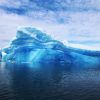 +36 +2
+36 +2Fresh Climate Data Confirms 2015 Is Unlike Any Other Year in Human History
Over the past few days, a bevy of climate data has come together to tell a familiar yet shocking story: Humans have profoundly altered the planet’s life-support system, with 2015 increasingly likely to be an exclamation point on recent trends. On Monday, scientists at Britain’s national weather service, the Met Office, said our planet will finish this year more than one degree Celsius warmer than preindustrial levels for the first time.
-
 +46 +2
+46 +2Groundwater is mostly non-renewable, study finds
The water that supplies aquifers and wells that billions of people rely on around the world is, from a practical perspective, mostly a non-renewable resource that could run out in many places, a new Canadian-led study has found. While many people may think groundwater is replenished by rain and melting snow the way lakes and rivers are, underground water is actually renewed much more slowly.
-
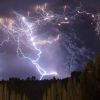 +22 +2
+22 +2Awesome Natural Phenomena
A collection of 49 very cool images of natural phenomena.
-
 +21 +1
+21 +1Japan Pledges $10.6 bn for Climate Policies in Developing Nations
Japanese Prime Minister Shinzo Abe on Thursday promised to give $10.6 billion to developing nations by 2020 to help them implement policies against global warming, ahead of the U.N. climate talks in Paris next week. The decision to offer 1.3-trillion yen ($10.6 billion) came after Japan gave a roughly combined 2.0 trillion yen for the same purpose in 2013 and 2014.
-
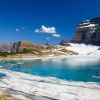 +40 +1
+40 +1If you want to see them, you’d better hurry. Iconic glaciers are disappearing — fast.
e river of ice that hugs Mount Grinnell’s high ridges is neither big nor particularly beautiful, but it may be the most accessible glacier in all of North America. In as little as three hours, an average hiker can traverse the mountain’s well-groomed trail to plant a foot on a frozen relic of the Little Ice Age. But if you want to see it, you’d better hurry. Grinnell Glacier is disappearing — fast.
-
 +35 +2
+35 +2How a 2 C Temperature Increase Could Change the Planet
UN warns of 'severe', 'irreversible' impact if global temperatures rise
-
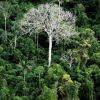 +39 +1
+39 +1Study: Half of Amazon Tree Species Could Become Extinct
More than half of the tree species in the Amazon, the world's most diverse forest, could become extinct if not protected from threats ranging from mining to climate-related fires and droughts, according to a study released Nov. 20 by Chicago's Field Museum. Some 36 percent to 57 percent of the Amazon's estimated 15,000 tree species probably qualify as “globally threatened” under International Union for Conservation of Nature criteria, said the study...
-
 +20 +2
+20 +2Paris climate politics: Let the corporate lobbying begin
Leaked documents reveal how European chemical group Cefic sought to water down green proposals for the Paris Business & Climate Summit.
Submit a link
Start a discussion




















